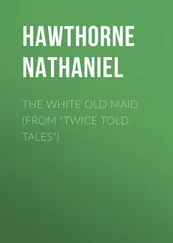A nature like Phoebe’s has invariably its due influence, but is seldom regarded with due honor. Its spiritual force, however, may be partially estimated by the fact of her having found a place for herself, amid circumstances so stern as those which surrounded the mistress of the house; and also by the effect which she produced on a character of so much more mass than her own. For the gaunt, bony frame and limbs of Hepzibah, as compared with the tiny lightsomeness of Phoebe’s figure, were perhaps in some fit proportion with the moral weight and substance, respectively, of the woman and the girl.
To the guest, — to Hepzibah’s brother, — or Cousin Clifford, as Phoebe now began to call him, — she was especially necessary. Not that he could ever be said to converse with her, or often manifest, in any other very definite mode, his sense of a charm in her society. But if she were a long while absent he became pettish and nervously restless, pacing the room to and fro with the uncertainty that characterized all his movements; or else would sit broodingly in his great chair, resting his head on his hands, and evincing life only by an electric sparkle of ill-humor, whenever Hepzibah endeavored to arouse him. Phoebe’s presence, and the contiguity of her fresh life to his blighted one, was usually all that he required. Indeed, such was the native gush and play of her spirit, that she was seldom perfectly quiet and undemonstrative, any more than a fountain ever ceases to dimple and warble with its flow. She possessed the gift of song, and that, too, so naturally, that you would as little think of inquiring whence she had caught it, or what master had taught her, as of asking the same questions about a bird, in whose small strain of music we recognize the voice of the Creator as distinctly as in the loudest accents of his thunder. So long as Phoebe sang, she might stray at her own will about the house. Clifford was content, whether the sweet, airy homeliness of her tones came down from the upper chambers, or along the passageway from the shop, or was sprinkled through the foliage of the pear-tree, inward from the garden, with the twinkling sunbeams. He would sit quietly, with a gentle pleasure gleaming over his face, brighter now, and now a little dimmer, as the song happened to float near him, or was more remotely heard. It pleased him best, however, when she sat on a low footstool at his knee.
It is perhaps remarkable, considering her temperament, that Phoebe oftener chose a strain of pathos than of gayety. But the young and happy are not ill pleased to temper their life with a transparent shadow. The deepest pathos of Phoebe’s voice and song, moreover, came sifted through the golden texture of a cheery spirit, and was somehow so interfused with the quality thence acquired, that one’s heart felt all the lighter for having wept at it. Broad mirth, in the sacred presence of dark misfortune, would have jarred harshly and irreverently with the solemn symphony that rolled its undertone through Hepzibah’s and her brother’s life. Therefore, it was well that Phoebe so often chose sad themes, and not amiss that they ceased to be so sad while she was singing them.
Becoming habituated to her companionship, Clifford readily showed how capable of imbibing pleasant tints and gleams of cheerful light from all quarters his nature must originally have been. He grew youthful while she sat by him. A beauty, — not precisely real, even in its utmost manifestation, and which a painter would have watched long to seize and fix upon his canvas, and, after all, in vain, — beauty, nevertheless, that was not a mere dream, would sometimes play upon and illuminate his face. It did more than to illuminate; it transfigured him with an expression that could only be interpreted as the glow of an exquisite and happy spirit. That gray hair, and those furrows, — with their record of infinite sorrow so deeply written across his brow, and so compressed, as with a futile effort to crowd in all the tale, that the whole inscription was made illegible, — these, for the moment, vanished. An eye at once tender and acute might have beheld in the man some shadow of what he was meant to be. Anon, as age came stealing, like a sad twilight, back over his figure, you would have felt tempted to hold an argument with Destiny, and affirm, that either this being should not have been made mortal, or mortal existence should have been tempered to his qualities. There seemed no necessity for his having drawn breath at all; the world never wanted him; but, as he had breathed, it ought always to have been the balmiest of summer air. The same perplexity will invariably haunt us with regard to natures that tend to feed exclusively upon the Beautiful, let their earthly fate be as lenient as it may.
Phoebe, it is probable, had but a very imperfect comprehension of the character over which she had thrown so beneficent a spell. Nor was it necessary. The fire upon the hearth can gladden a whole semicircle of faces round about it, but need not know the individuality of one among them all. Indeed, there was something too fine and delicate in Clifford’s traits to be perfectly appreciated by one whose sphere lay so much in the Actual as Phoebe’s did. For Clifford, however, the reality, and simplicity, and thorough homeliness of the girl’s nature were as powerful a charm as any that she possessed. Beauty, it is true, and beauty almost perfect in its own style, was indispensable. Had Phoebe been coarse in feature, shaped clumsily, of a harsh voice, and uncouthly mannered, she might have been rich with all good gifts, beneath this unfortunate exterior, and still, so long as she wore the guise of woman, she would have shocked Clifford, and depressed him by her lack of beauty. But nothing more beautiful — nothing prettier, at least — was ever made than Phoebe. And, therefore, to this man, — whose whole poor and impalpable enjoyment of existence heretofore, and until both his heart and fancy died within him, had been a dream, — whose images of women had more and more lost their warmth and substance, and been frozen, like the pictures of secluded artists, into the chillest ideality, — to him, this little figure of the cheeriest household life was just what he required to bring him back into the breathing world. Persons who have wandered, or been expelled, out of the common track of things, even were it for a better system, desire nothing so much as to be led back. They shiver in their loneliness, be it on a mountain-top or in a dungeon. Now, Phoebe’s presence made a home about her, — that very sphere which the outcast, the prisoner, the potentate, — the wretch beneath mankind, the wretch aside from it, or the wretch above it, — instinctively pines after, — a home! She was real! Holding her hand, you felt something; a tender something; a substance, and a warm one: and so long as you should feel its grasp, soft as it was, you might be certain that your place was good in the whole sympathetic chain of human nature. The world was no longer a delusion.
By looking a little further in this direction, we might suggest an explanation of an often-suggested mystery. Why are poets so apt to choose their mates, not for any similarity of poetic endowment, but for qualities which might make the happiness of the rudest handicraftsman as well as that of the ideal craftsman of the spirit? Because, probably, at his highest elevation, the poet needs no human intercourse; but he finds it dreary to descend, and be a stranger.
There was something very beautiful in the relation that grew up between this pair, so closely and constantly linked together, yet with such a waste of gloomy and mysterious years from his birthday to hers. On Clifford’s part it was the feeling of a man naturally endowed with the liveliest sensibility to feminine influence, but who had never quaffed the cup of passionate love, and knew that it was now too late. He knew it, with the instinctive delicacy that had survived his intellectual decay. Thus, his sentiment for Phoebe, without being paternal, was not less chaste than if she had been his daughter. He was a man, it is true, and recognized her as a woman. She was his only representative of womankind. He took unfailing note of every charm that appertained to her sex, and saw the ripeness of her lips, and the virginal development of her bosom. All her little womanly ways, budding out of her like blossoms on a young fruit-tree, had their effect on him, and sometimes caused his very heart to tingle with the keenest thrills of pleasure. At such moments, — for the effect was seldom more than momentary, — the half-torpid man would be full of harmonious life, just as a long-silent harp is full of sound, when the musician’s fingers sweep across it. But, after all, it seemed rather a perception, or a sympathy, than a sentiment belonging to himself as an individual. He read Phoebe as he would a sweet and simple story; he listened to her as if she were a verse of household poetry, which God, in requital of his bleak and dismal lot, had permitted some angel, that most pitied him, to warble through the house. She was not an actual fact for him, but the interpretation of all that he lacked on earth brought warmly home to his conception; so that this mere symbol, or lifelike picture, had almost the comfort of reality.
Читать дальше












